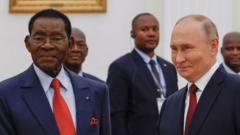Russia has reportedly dispatched between 100 and 200 military instructors to Equatorial Guinea, seemingly to bolster the security of the presidency as part of its expanding influence on the African continent. This development has been framed by media as a strategic move, following a meeting between Equatorial Guinea's President Teodoro Obiang Nguema Mbasogo and Russian President Vladimir Putin in September.
The instructors are reportedly stationed in key cities such as Malabo, the capital, and Bata, where they are training elite guards. These reports surfaced initially in August, indicating a timeline of growing military presence in the nation. Observers speculate that this contingent may include members of the Corps Africa, a renamed and restructured paramilitary group formerly known as Wagner, now operating under official Russian military oversight.
As Russia increasingly seeks to solidify its foothold in Africa, the implications of such military alliances raise concerns on multiple fronts. Russia’s efforts align with a broader trend among some West and Central African nations, where regimes are turning towards non-Western partnerships amid criticisms of inadequate support in addressing insurgency threats. This pivot has been coupled with a historical context of military and economic agreements with nations like China, in addition to the burgeoning relationship with Russia.
Equatorial Guinea, a small nation with a population of 1.7 million, has a long-standing autocratic president who has maintained power since 1979. His administration has often faced international scrutiny over its human rights practices, including reports of arbitrary killings and torture, as per a US government report. The recent military engagement has raised alarm among critics, including US-based human rights activists like Tutu Alicante, who suggest that the physical presence of Russian forces could undermine American geopolitical interests in the region.
The Equatorial Guinean government, eager for stronger military capacity, has also been pursuing gas and mineral exploration agreements with Russian and Belarusian entities, further intertwining its future with foreign powers. This involves a complex interplay of relations not just with Russia, but also with past alliances with Western powers, particularly in sectors like energy.
As some West African nations cautiously shift from traditional Western alliances towards emerging ties with Russia, it remains to be seen how this will reshape not only local political landscapes but also broader international relations in the region, challenging existing geopolitical paradigms.




















